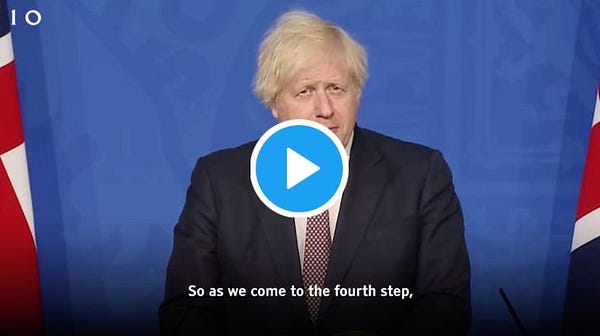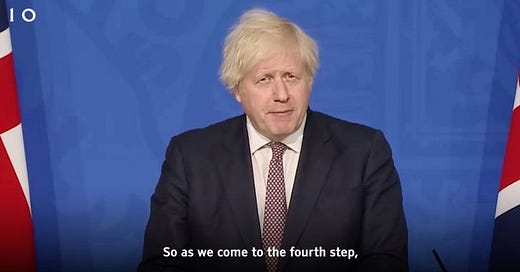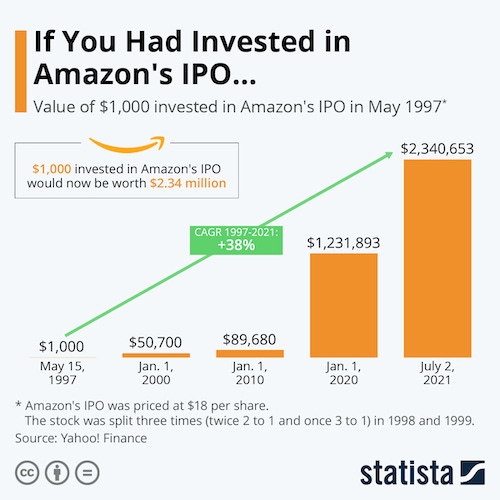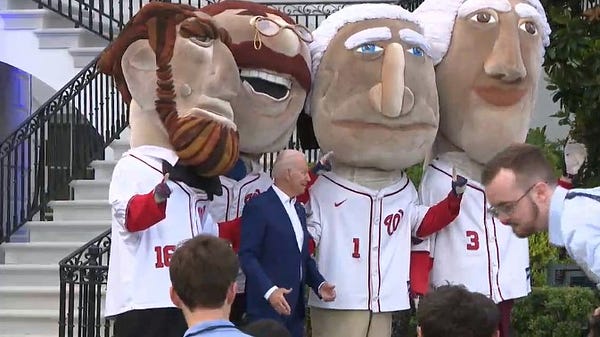Today’s posts that caught my eye:
At least 95 people were shot in Chicago over the July Fourth weekend, the Chicago Tribune reports. As I’ve asked before: What in the world is going on? That is an absurd and depressing number.
Average pay in the restaurant industry is now above $15 an hour for the first time, the Washington Post reports. The industry has had tremendous difficulty in bringing back workers. One question has been around lifestyle vs. compensation — restaurant work is hard, frequently with late hours. How much is needed in salary to bring employees back?
Today is Amazon’s first day without Jeff Bezos as CEO.
Subscribers support the creation of the newsletter, podcasts & live events.
The World
OPEC failed in its third attempt to resolve a deadlock over oil production after divisions between allies Saudi Arabia and the United Arab Emirates spilled into public and into global financial markets. The group called off a meeting scheduled for Monday with Russia-led oil producers after the U.A.E.—typically one of Riyadh’s most dependable supporters in the group—refused to agree to a Saudi-backed deal to boost output. Oil prices rose to fresh multiyear highs after the OPEC meeting was called off. (Wall Street Journal)
A hacking group that experts said was behind the sprawling ransomware attack that hit hours before the beginning of the July Fourth holiday weekend is demanding $70 million to unlock the thousands of businesses affected by the hack. REvil, the same Russian-language group that was behind the attack on meat processor JBS, posted the demand on a dark-Web site associated with the group. (Washington Post)
Between 800 and 1,500 businesses around the world have been affected by a ransomware attack centered on U.S. information technology firm Kaseya, its chief executive said. (Reuters)
The leaders of China, France and Germany threw their support behind an EU-China investment agreement, despite the deal’s failure to gain widespread backing in Europe. In a call between China’s Xi Jinping and counterparts Angela Merkel of Germany and France’s Emmanuel Macron, each expressed hope that the deal would be approved soon. The call came at an increasingly tense moment for EU-China ties, with growing concerns about China’s human rights record and coercive economic practices pervading both Brussels’ institutions and member states. (South China Morning Post)
The BioNTech/Pfizer vaccine is less effective at halting the spread of the Delta variant than previous strains of coronavirus, according to a preliminary study by Israel’s health ministry. Data collected over the past month suggest the vaccine is 64% effective at preventing infection among those who are fully inoculated. Efficacy against previous strains of the virus was estimated at 94%. However, the figures indicate the vaccine is 93% effective against serious illness and hospitalization. (Financial Times, Jerusalem Post)
Boris Johnson will revoke hundreds of Covid regulations and make England the most unrestricted society in Europe from 19 July despite saying new cases could soar to 50,000 a day before masks and social distancing are ditched. He said opening up – including the lifting of all limits on sports events and nightclubs – would be safest during the school summer holidays and did not say the changes would be irreversible. (The Guardian)
Israel will send South Korea some 700,000 doses of the Pfizer vaccine that are due to expire shortly. The deal comes weeks after the Palestinian Authority backed out of a similar agreement, saying the vaccine doses were too close to their expiration date despite Israel using the same batches to vaccinate teens. (Times of Israel)
Japan to extend COVID restrictions for 30m people until after Olympics. (Nikkei Asian Review)
GOP governors implore residents to get vaccine as variant rises: The call comes as polling shows that vaccine hesitancy has been driven by Republicans and as the virus's new, more contagious delta variant has caused recent upticks in COVID-19 cases in areas with low vaccination rates. (Washington Post)


Tajikistan's president ordered the mobilization of 20,000 military reservists to bolster the border with Afghanistan after more than 1,000 Afghan security personnel fled across the frontier in response to Taliban militant advances. The crossings on Sunday underscored the rapidly deteriorating situation in Afghanistan, where foreign troops near a complete withdrawal after 20 years of war and with peace negotiations stalled. (Reuters)
‘She’s a bit stuck’: Marine Le Pen looks for momentum after election flop. The French far-right leader defends her ‘detoxifying’ strategy to make presidential run-off round in 2022. (Financial Times)
A grim Independence Day weekend in Chicago was marred by violence, with at least 95 people shot. The sad tally includes two police officers; a 6-year-old girl and her mother; and a group of six people early Monday in the Washington Park neighborhood. (Chicago Tribune)
Economy
This year is shaping up to be the year of the pay raise: In the past three months, rank-and-file employees have seen some of the fastest wage growth since the early 1980s, as employers desperate to get workers back into restaurants, ballparks and plants are offering perks such as more time off, free food and higher pay to entice them to return. The pay hikes are reflected in the latest jobs report, which showed that the U.S. economy added 850,000 jobs in June, the strongest gain since last summer. Much of the hiring occurred in the restaurant, hotel and entertainment sectors that have seen the fastest wage gains. Average pay in the restaurant industry is now above $15 an hour for the first time. (Washington Post)
The Ontario Teachers’ Pension Plan is gearing up for a fresh C$70bn push into private markets, spanning assets from infrastructure to real estate, as one of the world’s largest retirement plans tries to escape the punishing effect of low interest rates. The C$221bn plan, which is responsible for managing the retirement savings of more than 300,000 Canadians, intends to invest the sum in private markets over the next five years, marking a break from the public markets it and other pension funds largely rely on for their returns. (Financial Times)
Researchers have developed a new machine learning technique to holistically assess water quality data in order to detect groundwater samples likely impacted by recent methane leakage during oil and gas production. Using that model, the team concluded that unconventional drilling methods like hydraulic fracturing do not necessarily incur more environmental problems than conventional oil and gas drilling. (Syracuse University)
Could miniature forests help air-condition cities? A Japanese botanist thinks the answer is “yes.” Outdoor pollution kills 4.2m people a year, according to the World Health Organization. Concrete and tarmac, meanwhile, absorb the sun’s rays rather than reflecting them back into space, and also displace plants which would otherwise cool things down by evaporative transpiration. (The Economist)
JPMorgan is taking another crack at healthcare. The bank is building a new unit focused on employee healthcare following the collapse of Haven, its partnership with Amazon and Berkshire Hathaway. (Wall Street Journal)
Technology
Tech giants including Google, Facebook and Twitter have warned Hong Kong of a potential exodus if the financial hub presses ahead with planned changes to its privacy laws that would make companies and staff legally liable for doxxing activities on their platforms. (Nikkei Asian Review)
A regional internet industry group with Facebook, Google, Twitter and Yahoo among its members has warned the tech giants could stop offering services in Hong Kong if a proposed anti-doxxing law goes ahead in the form proposed. The government is amending Hong Kong’s privacy laws to criminalize the malicious spreading of personal details, or doxxing. The move aims to rein in the kind of cyber harassment that became common during the 2019 anti-government protests, when police officers and their family members and supporters were commonly targeted. (South China Morning Post)
China's Cyberspace Administration ordered app stores to remove Didi Chuxing app, citing serious violations in the collection and usage of personal information. Beijing then further broadened a crackdown on tech platforms, targeting more US-listed companies after ordering the removal of ride-sharing group Didi Chuxing from Chinese app stores in a move that sent tech shares tumbling. (Bloomberg, Financial Times)
Twitter is partnering with veteran climate journalist and meteorologist Eric Holthaus to launch a local weather news service on the platform called "Tomorrow" that will be built using all of Twitter's new creator products — from paid newsletters to ticketed live audio rooms and more. "It's the largest collective of writers and experts we've launched with," Twitter's VP of product Mike Park said. (Axios)
After being canceled last year, Allen & Co.'s annual Sun Valley conference starts Tuesday with CEOs from Apple, Facebook, Amazon, and Netflix attending. Amazon’s Andy Jassy will mark his first Sun Valley appearance as CEO of the company, after succeeding Jeff Bezos in the role this week. (Vanity Fair, Wall Street Journal)
Jeff Bezos officially stepped down as Amazon CEO. (Seattle Times, Statista)
Smart Links
Virginia company giving 10 workers a chance at a year’s pay with vaccine lottery. (Washington Post)
47% of those in US don't have cable TV, including 60% of those 18-34. (MediaPost)
Electric vehicles make up 17% of new UK car sales for first time. (The Times)
Samsung Electronics Q2 profit likely up 38% on strong chip prices. (Reuters)
Hunting and hidden deaths led to estimated 30% reduction in Wisconsin’s wolf population. (University of Wisconsin-Madison)
How astronauts deal with the boring parts of being in space. (MIT Technology Review)
Drones may have attacked humans fully autonomously for the first time. (New Scientist)
Mars’ auroras snapped by Hope spacecraft: UAE spacecraft has taken the most detailed pictures yet of the ‘discrete auroras’ of Mars. (Nature)


Good News
A diver found a message in a bottle dated 1926. Then the hunt began for the family of the man who wrote it. “I hollered, ‘Grab my phone and snap a picture — I just found a message in a bottle!’ ” said Jennifer Dowker. (Washington Post)


Who’s the fastest President?
Subscribers support the creation of the newsletter, podcasts & live events.





